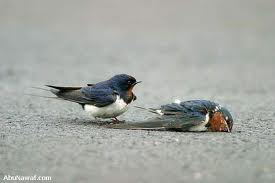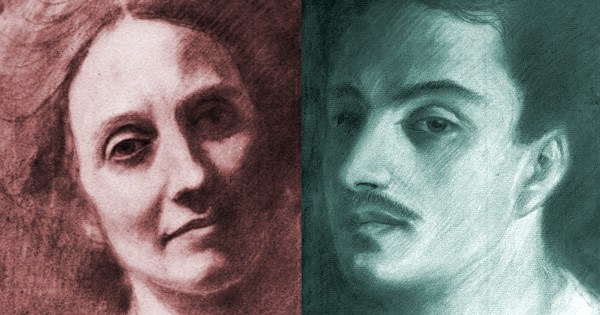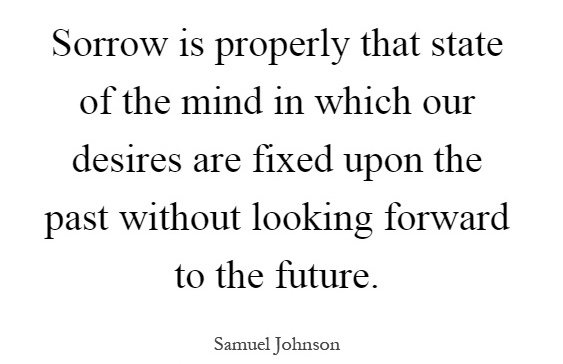|
Word Gems
self-knowledge, authentic living, full humanity, continual awakening
Sorrow, Sadness
Editor's 1-minute essay
return to 'sorrow' main-page
"I felt a funeral in my brain." Emily Dickinson

|
Word Origins
Sadness
Old English sæd, “sated, full, having had one’s fill, weary of.” Sadness is the fullness of feeling we experience at the loss of that which we value.
Sorrow
Derives from roots signifying “distressed, grieved” and “full of sores,” indicating pain, sickness, suffering.
|

Elenchus. I was glad for the new collection of quotes on sadness and sorrow. For personal reasons, it’s a subject I wanted to explore, something I needed to do.
Kairissi. But, Elenchus, we have such a good life coming up for us in Summerland, we’ll finally get everything we ever wanted. And so, why are you burdened by this?
E. Well, that’s the strange thing, and I told myself just what you said.
K. Would you like to share what’s bothering you?
E. It was very late at night. I was lying in bed. And, you know, that’s when the hobgoblins of hurtful memories come calling.
K. (silence)
E. Well, I was aware that I was vulnerable to attack and, in a sense, was even ready for it, but the ancient sorrows and sadnesses overwhelmed me.
K. (softly) What were you seeing?
E. You remember in the “winter wonderland” discussion, the two teen kids and their “to face unafraid the plans that we made”?
K. The images from that song we found deeply moving.
E. I was cast back in time to that period of our lives… and, once again, to revisit what ought to have been, what we really wanted to do, had we been just a little more mature.
K. We wanted to meet at my house almost every night and do homework together. We were so excited about becoming top students, because this was a way for us to prepare for our future together. We wanted to work as teachers later, and be married right after graduation, and attend college together.
E. Well, we’ve been over this and over this, but I saw it all once again in my mind, in vivid color and action. But, it seemed to be different this time. I found myself falling into a wide-and-deep pit of sorrow and sadness over what we lost. It was so oppressive. It was like… heavy convulsive mourning and torment… I didn’t actually weep, but I wanted to.
K. (softly) It was Emily’s “funeral in the brain.”
E. And it was all directed toward what we lost in this life. And, yes, as you say, we’re going to get it all back in Summerland, in a perfect world. And in that “midnight confession,” I counseled myself, “Why are you doing this to yourself?” – like a phrase from the Psalms, “Why are you cast down, oh, my soul?”
K. And in the Psalms, the answer is, “Trust thou in God.”
E. And, of course, that is the answer, but, in that late hour, I wasn’t able to reason with or steady myself. I reminded myself, in stern terms, “Everything’s alright, you and the one you love will be able to recapture that good life we lost, in a coming world where good things do not fade and cannot be taken away."
K. Why was this not convincing to you?
E.I asked myself this very question. Why did I fall into that deep pit of grief when, I knew full well, in a short time, you and I would be together to reclaim everything that was lost.
K. (silence)
E. And then it occurred to me, more forcibly than before – sorrow and sadness are just illusions. They’re not real.
K. There are many famous quotations on the main-page which put forward the same.
E. It came to my mind, something I heard from Tolle years ago, but didn’t really get it:
the ego wants to want, more than it wants to have
E. Look at what was happening to me. I was lying in bed, offering myself sturdy assurances, based upon the “scientific evidence for the afterlife,” that I had nothing to worry about.
K. But the ego wasn’t interested in the facts. It just wanted to want, to revel in its own images of neediness, more than having, or receiving actual answers to its worries.
E. And in the darkness, I saw this clearly. It was like trying to reason with an insane person. The facts didn’t matter.
K. I am learning from what you say – because, for a long time it’s made sense to me that sorrow and sadness are something real, because if you lose something you really want and love, then grief would be a normal response.
E. But once we perceive that this world is not the real world, and that what happens here is just a training program, then there’s no need to have that “funeral in the brain” because everything’s going to be made right in our home world.
|

E. This issue of insanity deserves special treatment. Some expressions of sorrow and sadness fall outside the pale of normal grief. Sometimes it’s an insane reaction of the ego wanting compensation or even revenge. I’m thinking of what Lateece warned us about, so long ago now – the “madness maddened.”
K. (silence)
E. Sometimes I fall into a dark pit of rage as I bring to mind those events of the past which I have counted as betrayal – such a long time ago now, but – when you went out with that older guy, not such a great fellow; and how you treated me so disrespectfully at that dance, and then for years you wouldn't look at me or talk to me; and then you went on to worse things when you agreed to be with someone of lowbrow character. I’ve tried to put this out of my mind, have told myself it’s all in the past, but willpower cannot put this right.
K. (softly) It has been one of my greatest fears that you will not be able to forgive me for things of the past.
E. I want to. I don’t want to be chained to sordid images of those bygone times. But sometimes the old rage grows and grows and, in that state, I don’t want to forgive you, and never want to see you again. It gets so bad – the insanity, so intense that – even if I could see into your soul and know that you are truly changed and repentant, I would still reject you, and want to punish you. But this reaction, clearly, is of the insane heart of darkness, it can’t be reasoned with, and willpower will not save us.
K. Can we put ourselves back together, Elenchus?
E. The “better angel of my nature” whispers to me, yes, as we still have those soul bonds. But I’m not there yet, in terms of fully accepting this reality.
K. (softly) What can we do?
E. I see us in Summerland. You come to me, but I’m still not sure if I can get past my hidden raging. I suggest, however, that you visit me often and for us to walk in the large pasture on my farm. I tell you that, if you’re willing, I would like to hear of your exact thoughts during those hurtful times of waywardness. And I will share what’s going on in my own heart. Much of this will not be pretty, may be brutal, with these “confirmation hearings” not winning congeniality awards. But, if I am ever to trust you again, to put my life and future happiness in your hands, and finally set to rest, and expunge, the nightmare images, I think this is what we need to do.
|
|
Editor’s note: This issue of putative lovers unable to forgive is not unique. Even Kahlil Gibran, world famous for his romantic poetry, struggled here concerning his love interest, Mary Haskell.
“I feared,” said she, “that I had harmed that which is between us”; much worse, she wondered if her betrayals would mean that what they had together would now be “forever less,” a tarnished ideal, a lingering unforgiveness, her image as personification of Love sullied, to “all eternity”.
Is this judgment too harsh? for, if so, who could be married? nevertheless - can a man be with a woman, for all eternity, if he cannot worship her, find inspiration from her, envision her, as font of purity, life, and light?

Kahlil’s letter, January 28, 1915, New York
Perhaps our spring is not in this life, Mary. This life may be nothing but a winter.
Mary’s letter, April 18, 1915, New York
All week the past has been opening before me and I have remembered more of what I did and said – the outrages and the unkindnesses. And I so feel that I did not believe the few loving things you said, or hear the many you did not say; and how far from simply and tenderly I loved you. And I know somewhat how I hurt you and what I threw away and kept away from both of us. Seeing these things, I feared that I had harmed that which is between us, and had made it forever less than it might have been. That would be the hardest punishment I could have, for all eternity… I am sorry for all I spoiled, and for every pain I gave you – and sorry that sorrow cannot undo what I did.
|
postscript
K. Elenchus, there is something about that vision of us studying together, preparing for our future lives, anticipating our marriage – all of that, that whole cluster ideas – that is so devastating to us! I know in Summerland we won’t be doing homework at my mother’s kitchen table, but there’s a part of this that affects us profoundly.
Editor’s note: See the March 31, 1953 Krishnamurti lecture where he speaks to a woman who has lost her son. Extensive Editor’s comments are also offered which relate directly to what Elenchus, above, refers to as his “insanity.”
|
Editor's last word:
On the “sorrow” main-page, there’s a good quote which summarizes a core issue of sorrow.

But it’s not just a failure to recognize blessings to come.
Krishnamurti expanded the field of sorrow in one of his lectures. He said it’s the result of building one’s life on “becoming” rather than “being.”
Becoming focuses on a neurotic condition of not having enough, but being rests in its own sufficiency. A big difference, and this is probably the primary impetus for sorrow.
Above, Elenchus' sorrow, by his own admission, felt like an insanity. This can happen when nothing's really wrong, but the ego just wants something, and will not be quiet.

Tony: (infatuated with Black Widow) “I want one.”
Pepper: (speaking to him as if he were a child) “Noooo…”
|
how to expunge sorrow and other confusions from the mind
31.Mar.1953. Question: My son is dead. How am I to meet that sorrow? Krishnamurti: We are forever running away from sorrow. We seek for distractions. But when we relinquish self-protective mechanisms, when the mind is not seeking any solution, is completely silent, in that state, sorrow ceases to be.
|




